Increased investment and product expansion for BKT
27th March 2023
Tyre manufacturer BKT is growing its product offering and investing heavily in its already impressive Bhuj, India manufacturing plant. The company’s global sales exceeded $1Bn last year, and there are plans to double that figure within just three years. David Williams visited the factory and met the owners to find out why the brand is so successful.
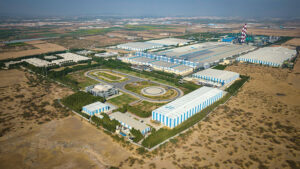
The Bhuj plant site covers 258ha currently, but additional land recently purchased will extend this to 323ha – enabling tyre, track and Carbon Black manufacturing capacity to be increased.
Balkrishna Industries Ltd (BKT) is a relative newcomer to the agricultural tyre market. The company was formed in 1987 to supply off-highway tyres filling a gap between expensive, premium brands and budget versions, to suit the average user. Since then, continued investment in research and development and meticulous attention to detail has paid off. Now the company’s huge range of more than 3,400 sizes of tyre includes high specification IF and VF radials capable of competing with other premium brands, and BKT tyres are listed as OE fitment options by many leading tractor manufacturers. Recent additions to the BKT offering include rubber tracks, and tyres for special applications.
Research and development
One of BKT’s strengths is that the company builds its own tyre moulds, shortening lead times when adding new tyres to the range. Minor adjustments to optimise tread patterns can be achieved almost immediately, allowing tyres to be produced meeting specific requirements.
A state-of-the-art 10ha research and development centre at the Bhuj site was completed in 2017, allowing intensive testing of new tyres and technology, and contributes to the short lead times for new tyres. Compounds, carcase and tread designs are all thoroughly evaluated.
A tour of the testing centre included simulators – developed with Volvo, where operators sit at the ‘controls’ of earthmovers and dumpers and ‘drive’ them around work sites. Impacts and loads are assessed, and the data helps the development team design tyres ideal for the intended tasks.
An outside test area comprises six types of tracks and allows tyre evaluation on vehicles before final testing by customers.
The thorough testing results in an extremely low failure rate of less than 0.25%, even though the radial tyres come with a six-year warranty.
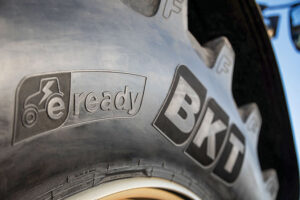
E-Ready tyres for electric tractors are a recent development.
Catering for the future
Advanced construction techniques have been used to create a new range of tyres for electric-powered tractors. The new tyres carry an E-Ready logo and BKT explained that
reasons special tyres are needed include up to 30% additional unladen weight due to the heavy batteries; additional drive torque – especially when pulling away – so beads must achieve a firm grip to the rim and tread sections have to be optimised in terms of design and compound. Also, to achieve maximum working time between battery charging, the rolling resistance had to be minimised. This can account for as much as 20% of energy consumption, so the tread pattern, compound and sidewall structure were optimised. Noise levels are affected by the tread pattern, compound composition and tyre size, so these were also designed for quiet operation.
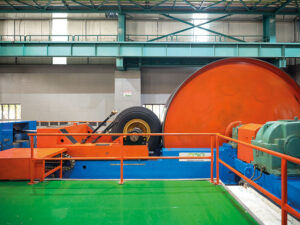
Tyres are put through a tortuous testing regime, including load stress simulated by a 5m steel wheel.
Track range imminent
BKT has also added Agriforce rubber tracks to its range – with general availability due later this year. There are three types for different applications – construction, harvesters and agricultural.
Harvester tracks available initially will include 450-90-60 and 450-90-51. Agricultural tracks come in 18-6-44, 18-6-53, 18-6-54, 18-6-58 and 18-6-59. Product manager, Hemant Sawant explained that current track production is five tonnes, or 20–25 units per day, but by 2024 production up to 50 tonnes of tracks per day will be possible, and a new dedicated track manufacturing facility is under construction to meet anticipated demand.
Heavy-duty solid rubber tyres
BKT also used the event to announce that solid rubber tyres will be available from the second half of this year. For industrial applications including forklifts and materials handlers, the tyres have holes through the profile to provide cushioning and reduce shock loads and vibration. Three sizes will be available initially including 20.5-25, 23.5-25 and 26.5-25.
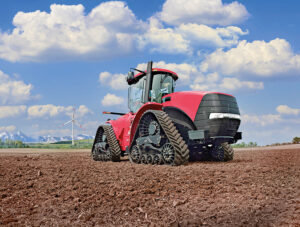
Rubber tracks for industrial applications, harvesters and agricultural machines will be available later this year.
Specialist forestry tyres
A range of dedicated forestry tyres is also being added. “The key challenge is navigating forest terrain,” explained BKT president and director of technology, Dilip Vaidya. “Our current agro-forestry tyres are suitable for use off- and on-road, on tractors and other specialist machinery, but the forestry tyres are exclusively for use off-road on forwarders, skidders and harvesters.” Designated ForestMax, the new tyres have eight plies and three steel belts and a special tread compound which withstands the high wear and tear typical in forestry applications.
Largest tyres
Larger tyres from BKT include its earthmover range. The biggest size currently is 46/90R57 – weighing 4,139kg per unit and standing 3,575mm tall. Each tyre is made from 28 separate components and each bead weighs 140kg. Each tyre carries 63t, providing total weight carrying capacity of up to 240t across four tyres on a rear axle. BKT explained that the tyres not only achieve excellent load carrying ability; they are also designed for operator comfort which is essential in demanding quarry situations. Tyres with an even larger 63in rim diameter and weighing 7,000kg each are under development and due to be available to purchase from August, with a 5,000-hour warranty and an 8,000-hour predicted working life.
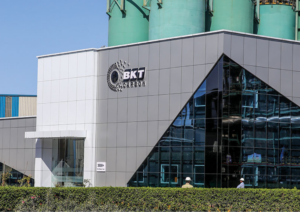
BKT Carbon will supply Carbon Black for BKT tyre production and to external customers.
Rapid growth
When tyre production started at Bhuj, the site was just 123ha and represented a $500M investment. The current site is 258ha, but land recently purchased adjacent to the plant increases the area by almost 30% – to 323ha. The additional $0.5Bn planned investment includes tyre production facilities, but also a move into Carbon Black manufacturing on a massive scale. Carbon Black is essential for tyre manufacturing, and accounts for up to 25% of a tyre’s construction.
BKT has invested in a new approach to production at its plant – making the process more sustainable and reducing CO2 emissions. Energy produced as a by-product during manufacture helps power the plant. Approximately 70% of the Carbon Black produced is used by BKT, and the rest is sold to external customers including tyre manufacturers.
Managing environmental impact
BKT is proud of its environmental credentials. Approximately 30% of the site area is green, and an onsite nursery produces bushes and trees for the plant. The environmental impact of tyre and Carbon Black production is monitored, and particulate and emissions figures are available to view at monitoring stations at the site. Emissions are approximately half the legal limits – which a spokesman explained are stricter in India than in most other countries. “The key is managing the emissions to operate as cleanly as possible.” All water used is recycled and nothing is discharged outside the plant.
BKT also acknowledges its responsibility to the local population and confirmed investment in a school for up to 1,800 pupils to be built adjacent to the plant, and which will also be available for use by adults out of school hours.
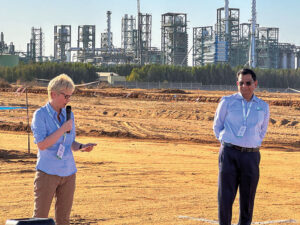
Announcing factory expansion onto the new land – BKT Europe marketing and communications manager Gabriella Usiello with president of operations, Narendra Kumar.
Future growth
In 2022, the BKT Bhuj plant achieved total tyre production averaging 436t per day, contributing to the company’s total sales of $1Bn. Development of the additional land and construction of the new tyre and Carbon Black production facilities is due to start soon, and Rajif Poddar expects them to be operating within just two years and by 2026 the company’s plan is to produce 600,000 metric tonnes of tyres annually. Up to 1,240 families and 400 apprentices recruited from colleges and seeking practical experience will be living in housing provided at the Bhuj site.
“We are not just a tyre company,” concluded Rajif Poddar. “Global tyre demand is growing, and we see no signs of it slowing down over the next five years. Our vision is simple which is why it is certain.”
Read the full article on Page 73 of March’s Farmers Guide.
